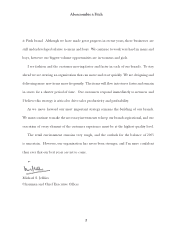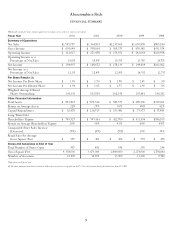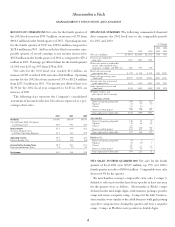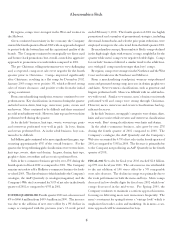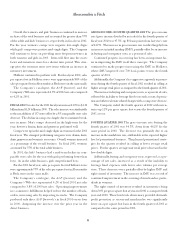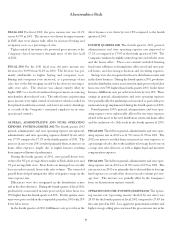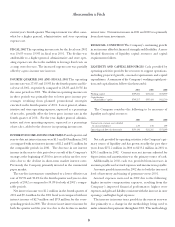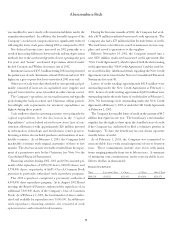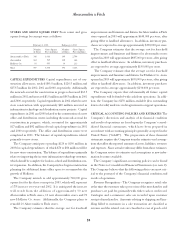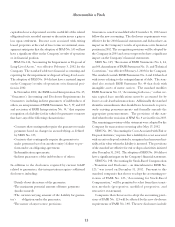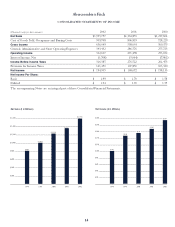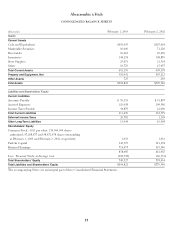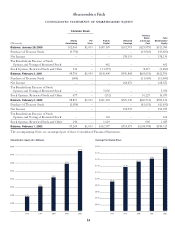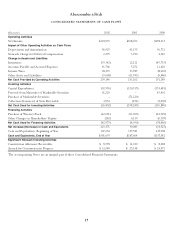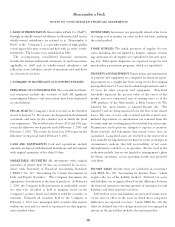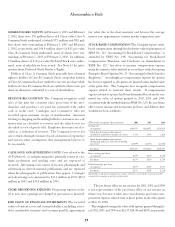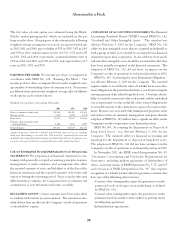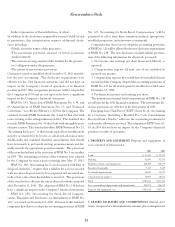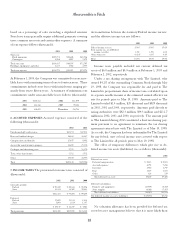Abercrombie & Fitch 2002 Annual Report Download - page 15
Download and view the complete annual report
Please find page 15 of the 2002 Abercrombie & Fitch annual report below. You can navigate through the pages in the report by either clicking on the pages listed below, or by using the keyword search tool below to find specific information within the annual report.
capitalized cost is depreciated over the useful life of the related
obligation for its recorded amount or the entity incurs a gain or
loss upon settlement. Because costs associated with exiting
leased properties at the end of lease terms are minimal, man-
agement anticipates that the adoption of SFAS No. 143 will not
have a significant effect on the Company’s results of operations
or its financial position.
SFAS No.144, “Accounting for Impairment or Disposal of
Long-Lived Assets,” was effective February 3, 2002 for the
Company. The standard addresses financial accounting and
reporting for the impairment or disposal of long-lived assets.
The adoption of SFAS No. 144 did not have a material impact
on the Company’s results of operations or its financial posi-
tion in 2002.
In November 2002, the FASB issued Interpretation No. 45,
“Guarantor’s Accounting and Disclosure Requirements for
Guarantees, including indirect guarantees of indebtedness of
others, an interpretation of FASB Statements No. 5, 57, and 107
and rescission of FASB Interpretation No. 34,” that requires
recognition of a liability (at fair value) for guarantee contracts
that have any of the following characteristics:
■ Contracts that contingently require the guarantor to make
■ payments based on changes in an underlying, as defined
■ by SFAS No. 133;
■ Contracts that contingently require the guarantor to
■ make payments based on another entity’s failure to per-
■ form under an obligating agreement;
■ Indemnification agreements;
■ Indirect guarantees of the indebtedness of others.
In addition to the disclosures required by current GAAP
related to guarantees, this interpretation requires additional
disclosures including:
■ Details about the nature of the guarantee;
■ The maximum potential amount of future payments
■ (undiscounted);
■ The current carrying amount of the liability for guaran-
tor’s ■ obligation under the guarantee;
■ The nature of any recourse provisions.
Guarantees issued or modified after December 31, 2002 must
follow the new accounting. The disclosure requirements were
effective for the 2002 financial statements and did not have an
impact on the Company’s results of operations or its financial
position in 2002. The recognition provisions will be adopted by
the Company in 2003 and are not expected to have a significant
impact on the Company’s financial statements.
SFAS No. 145, “Rescission of FASB Statements No. 4, 44,
and 64, Amendment of FASB Statement No. 13, and Technical
Corrections,” was effective February 2, 2003 for the Company.
The standard rescinds FASB Statements No. 4 and 64 that deal
with issues relating to the extinguishment of debt. The stan-
dard also rescinds FASB Statement No. 44 that deals with
intangible assets of motor carriers. The standard modifies
FASB Statement No. 13, “Accounting for Leases,” so that cer-
tain capital lease modifications must be accounted for by
lessees as sale-leaseback transactions. Additionally, the standard
identifies amendments that should have been made to previ-
ously existing pronouncements and formally amends the
appropriate pronouncements. The provisions of this stan-
dard related to the rescission of SFAS No. 4 are in effect in 2003.
The remaining provisions of the statement were adopted by the
Company for transactions occurring after May 15, 2002.
SFAS No. 146, “Accounting for Costs Associated with Exit or
Disposal Activities,” requires that a liability for a cost associated
with an exit or disposal activity be recognized and measured ini-
tially at fair value when the liability is incurred. The provisions
of the standard are effective for exit or disposal activities initiated
after December 31, 2002. The adoption of SFAS No. 146 did not
have a significant impact on the Company’s financial statements.
SFAS No. 148, “Accounting for Stock-Based Compensation
– Transition and Disclosure – an Amendment to FASB No.
123,” was issued on December 31, 2002. Pursuant to this
standard, companies that choose to adopt the accounting pro-
visions of FASB No. 123, “Accounting for Stock-Based
Compensation,” will be permitted to select from three transi-
tion methods (prospective, modified prospective, and
retroactive restatement).
Companies that choose not to adopt the accounting provi-
sions of FASB No. 123 will be affected by the new disclosure
requirements of FASB No. 148. The new disclosures include
Abercrombie &Fitch
12


